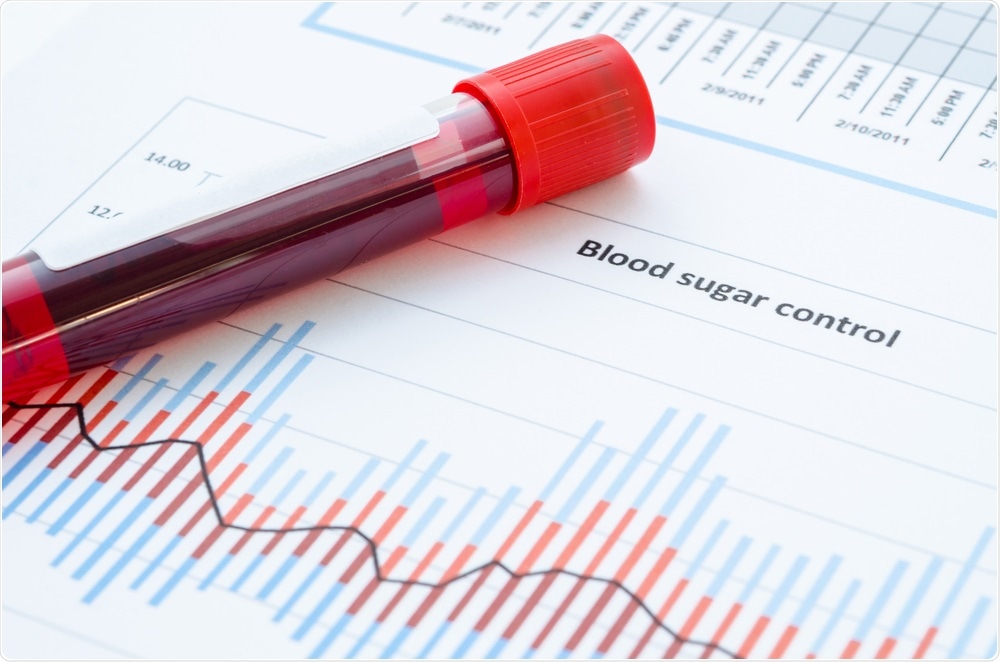Scientists have made an important discovery that may explain why people with type 1 or type 2 diabetes are at an increased risk for developing some forms of cancer.
The findings could solve a medical mystery that scientists have been puzzling over for years: why diabetics show higher rates of some cancers. They also suggest that patients with diabetes could immediately reduce their risk of cancer by managing their blood sugar levels more effectively.
 Room's Studio | Shutterstock
Room's Studio | Shutterstock
John Termini from City of Hope, a research and treatment center for cancer and diabetes, will present the findings this Thursday at the American Chemical Society (ACS) Fall 2019 National Meeting & Exposition. ACS is the world's largest scientific society and features more than 9,500 presentations covering a wide range of scientific topics.
Termini and team have found that DNA undergoes more damage and is repaired less often when blood sugar is high, compared with when it is normal:
It's been known for a long time that people with diabetes have as much as a 2.5-fold increased risk for certain cancers. As the incidence of diabetes continues to rise, the cancer rate will likely increase, as well.”
John Termini, Ph.D.
Scientists previously thought that hormone dysregulation was the culprit
Examples of cancers that diabetics are at an increased risk for include ovarian, breast and kidney cancer. It is therefore unsurprising that scientists suspected that the increased risk was due to hormone dysregulation.
In type 2 diabetes, insulin is poorly transported into cells. This means the pancreas produces more and more insulin, which results in an elevated blood insulin level (hyperinsulinemia). As well as controling blood sugar levels, insulin can promote cell growth and possibly lead to cancer.
In addition, the majority of people with type diabetes are overweight, with an excess of fatty tissue that produces more adipokines than healthy-weight people. These adipokines are hormones that promote the chronic inflammation associated with cancer.
"The most common idea is that the increased cancer risk has to do with hormones. That's probably part of it, but there hasn't been a lot of solid evidence," says Termini.
Researchers wondered whether increased blood sugar damages DNA
Termini wondered whether the increased blood sugar level seen in diabetics could damage DNA and make the genome unstable, which could cause cancer to develop.
To investigate, Termini and team searched for chemically modified DNA bases called adducts in tissue cultures and mice model of diabetes.
They found that one DNA adduct called N2-(1-carboxyethyl)-2'-deoxyguanosine (CEdG) occurred more often in the models of diabetes than in healthy cells or mice. Furthermore, a high blood sugar level disrupted the cellular process that would repair the damage.
Exposure to high glucose levels leads to both DNA adducts and the suppression of their repair, which in combination could cause genome instability and cancer."
John Termini, Ph.D.
More recently, the researchers conducted a clinical study that assessed levels of CEdG levels and its RNA counterpart CEG in individuals with type 2 diabetes. Indeed, levels of CEdG and CEG were significantly higher among type 2 diabetics than among healthy individuals.
What happens at the molecular level?
Next, the team wanted to find out what happens at the molecular level that would stop the adducts from getting fixed properly. They found two proteins seem to be involved that were less active in people with diabetes. The transcription factor HIF1α activates genes involved in the repair process and the signaling protein mTORC1, is responsible for regulating HIF1α.
The researchers found that if they stabilized HIFα under high-glucose conditions, DNA repair increased and DNA damage decreased: “…mTORC1 actually controls HIF1α, so if you stimulate mTORC1, you stimulate HIF1α," said Termini.
Can we use existing drugs to decrease cancer risk?
Since drugs that activate HIF1α or mTORC1 are already available, the team will now investigate whether their administration decreases cancer risk in animal models of diabetes. If so, the researchers will test the drugs in humans.
Termini also points out that the commonly used diabetes drug metformin (multiple brand names), which lowers blood sugar levels, also promotes DNA repair.
"We're looking at testing metformin in combination with drugs that specifically stabilize HIF1α or enhance mTORC1 signaling in diabetic animal models," he says.
Meanwhile, it is possible that a more immediate way for people with diabetes to lower their risk for cancer could be to better control their blood sugar level. Termini acknowledges that although this may sound like a simple solution, “it's extremely difficult for most people to maintain glycemic control.”